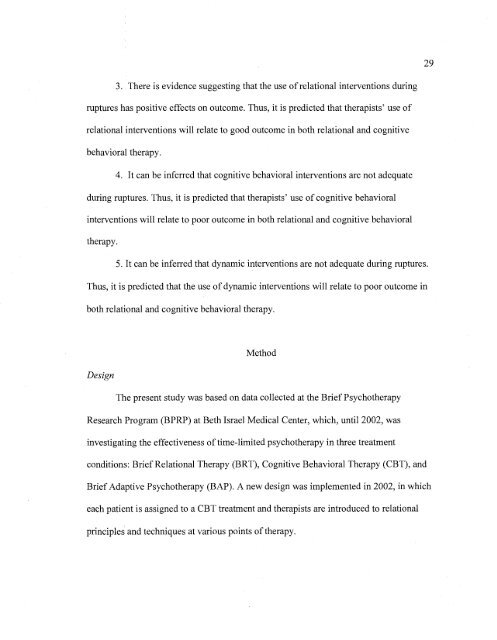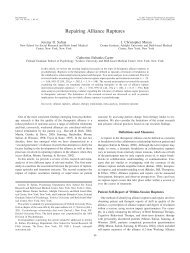Download - The Safran Lab
Download - The Safran Lab
Download - The Safran Lab
Create successful ePaper yourself
Turn your PDF publications into a flip-book with our unique Google optimized e-Paper software.
3. <strong>The</strong>re is evidence suggesting that the use of relational interventions during<br />
ruptures has positive effects on outcome. Thus, it is predicted that therapists' use of<br />
relational interventions will relate to good outcome in both relational and cognitive<br />
behavioral therapy.<br />
4. It can be inferred that cognitive behavioral interventions are not adequate<br />
during ruptures. Thus, it is predicted that therapists' use of cognitive behavioral<br />
interventions will relate to poor outcome in both relational and cognitive behavioral<br />
therapy.<br />
5. It can be inferred that dynamic interventions are not adequate during ruptures.<br />
Thus, it is predicted that the use of dynamic interventions will relate to poor outcome in<br />
both relational and cognitive behavioral therapy.<br />
Design<br />
Method<br />
<strong>The</strong> present study was based on data collected at the Brief Psychotherapy<br />
Research Program (BPRP) at Beth Israel Medical Center, which, until 2002, was<br />
investigating the effectiveness of time-limited psychotherapy in three treatment<br />
conditions: Brief Relational <strong>The</strong>rapy (BRT), Cognitive Behavioral <strong>The</strong>rapy (CBT), and<br />
Brief Adaptive Psychotherapy (BAP). A new design was implemented in 2002, in which<br />
each patient is assigned to a CBT treatment and therapists are introduced to relational<br />
principles and techniques at various points of therapy.



